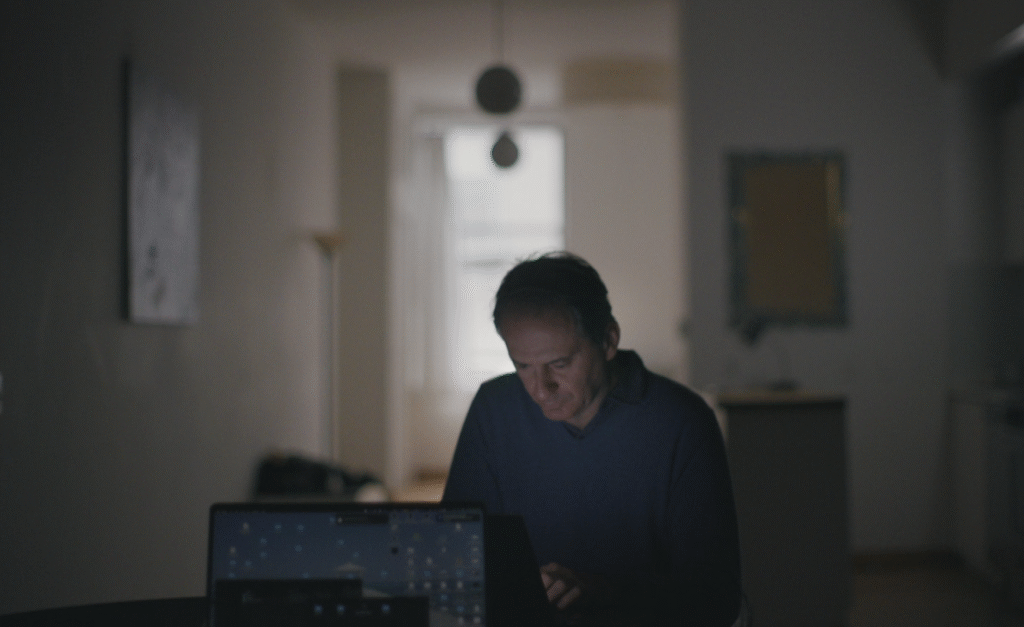At The Human Library in Denmark’s capital, readers can check out actual living people who volunteer to serve as “open books." The idea is for them to be able to have one-on-one conversations and ask questions in an attempt to “unjudge” each other. The initiative has become popular around the world, but the organizers say these open-minded conversations seem less and less welcome in today's climate of rising divisions. The post People are ‘open books’ at Copenhagen’s Human Library appeared first on The World from PRX.
On a recent Sunday morning, Rachel Dover visited Copenhagen’s Human Library. But unlike a traditional library where she would browse the stacks for a new read, the 58-year-old from Glasgow, Scotland, was there to volunteer as an “open book” for other people to consider.
A chalkboard by the reference desk listed the day’s “book titles,” which included “Being a Gay Parent” and “Giving Up a Child for Adoption” — both available in English or Danish. Others, like “Subjected to Incest” and “Former Sex Addict,” were exclusively in Danish.
Under the title “Transgender,” curious visitors could borrow Dover for a 30-minute conversation in the library’s reading garden.
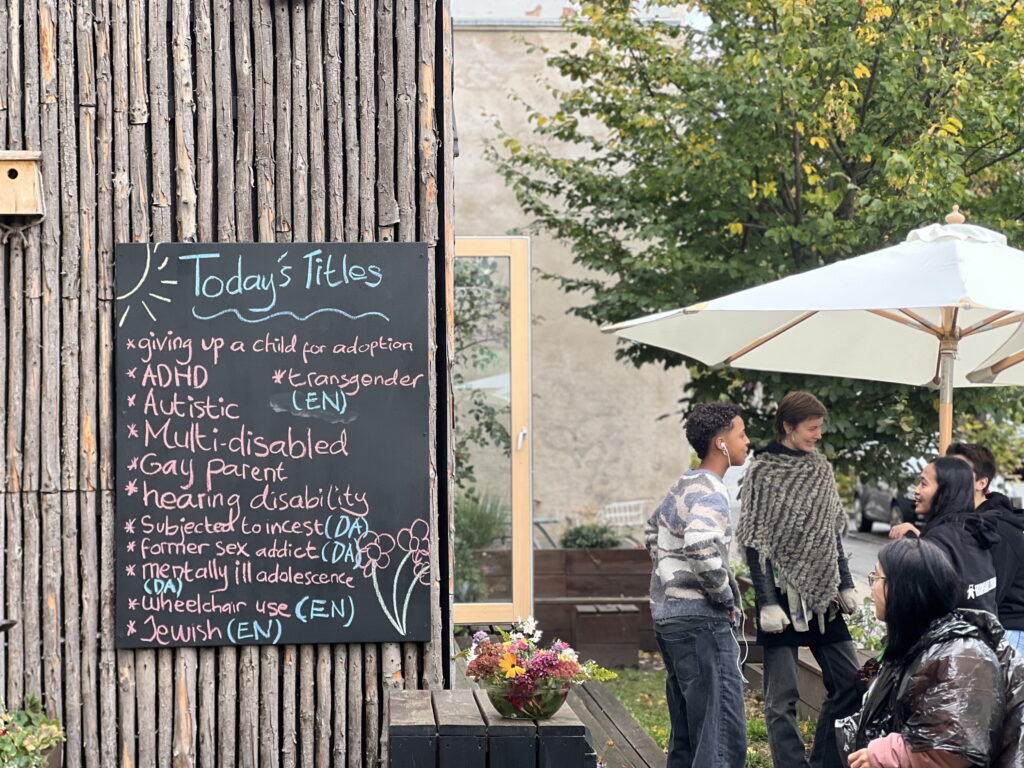
“What we’re here to do as ‘books’ is to answer questions about our lived experience,” Dover explained. “I like to say at the beginning of every reading that I do that I am a literal open book. I will answer any and all questions … and I’m not going to get offended.”
Copenhagen’s Human Library lends out actual living people who volunteer to serve as “open books” for readers to check out for one-on-one conversations. These “books” share a wide range of personal perspectives. Since it opened 25 years ago, the nonprofit’s mission to “unjudge” people has caught on globally, with The Human Library events now hosted in more than 85 countries. But organizers say these open-minded conversations seem less and less welcome in today’s climate of rising divisions.
Sitting on a bench surrounded by potted plants and the chatter of fellow books and readers, Dover described her journey to coming out as a trans woman in 2018. “The clues were always there,” she said.
Growing up with two older sisters, Dover recalled always being the first to reach for a dress when playing dress-up games. Or when her sisters wanted to practice their makeup on her, she pretended not to like it, but also “never ran away from it.” At the same time, Dover has also enjoyed hobbies that she describes as “stereotypically male,” like dirt bikes and competitive shooting. “Western society has told us, this is what boys do. … It’s only what we’ve been brought up with,” Dover said. “Recognizing that I was transgender took a long time.”
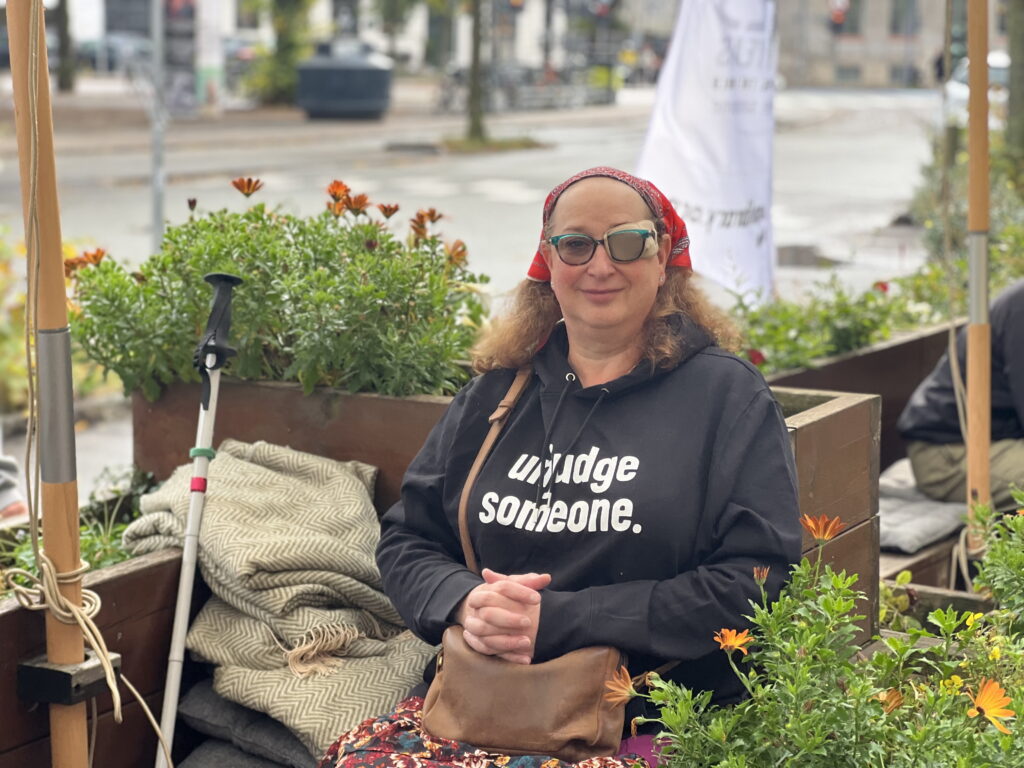
But Dover said that even if all questions are welcome, the intention behind the question also matters. According to Dover, who also offers to share experiences under the title “Jewish,” a reader once asked: “What gives you the right to blow up all those Palestinians?”
“It was such a ragingly antisemitic question that … it triggered me good and proper. … That’s the only time I’ve truly been shocked by a question,” she said. “If I’m asked that question again, and I have been in different ways, I reflect it back and ask, ‘Well, I’m Jewish, but I’ve explained in my introduction that I’m British, not Israeli. Why are you trying to hold me responsible for what a foreign government does? Simply because I share some of the traditions and ethnicity.’”
Even when uncomfortable or blatantly offensive, Dover said the value of opening up to a stranger at The Human Library lies in fostering honest exchanges.
“You’re welcome to have your agenda, but if you really want to learn from other people, you have to create an atmosphere where everyone can be honest and have space to make their mistakes and see things the wrong way, and not pick holes in every single intonation and phrase in what someone is saying,” she said. “And that’s why The Human Library is so important … It should be the norm to be able to have these conversations.”
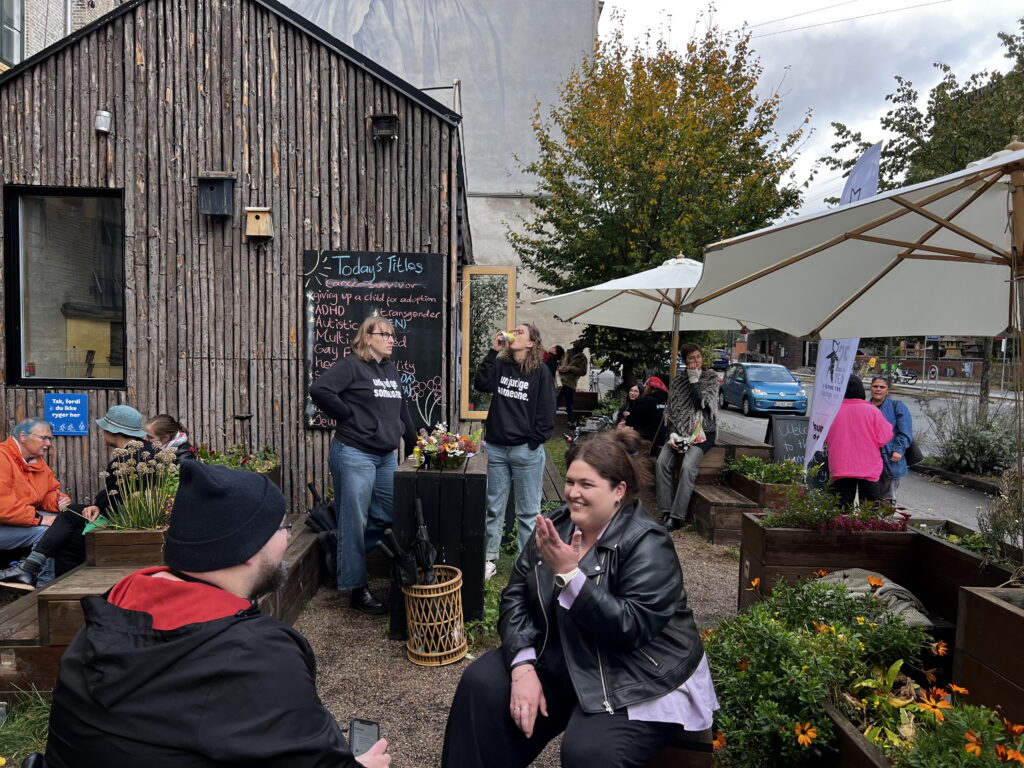
But the “ask me anything” ethos of The Human Library does expose “open books” to questions that can feel unanswerable at times.
Tom Fadden, 37, who was diagnosed with cerebral palsy at the age of two, offered readings that day under the book title “Wheelchair User.” He said the most challenging question he has been asked was, effectively, whether or not he should exist.
“Essentially, a question around, should my parents, if they knew I was disabled, should they have done something? So, should I have been aborted,” Fadden said. “And that was probably the most challenging question I had … but I wanted to sit with it and understand where it came from.”
While he found the question hurtful at first, Fadden believes these exchanges help both readers and books grow.
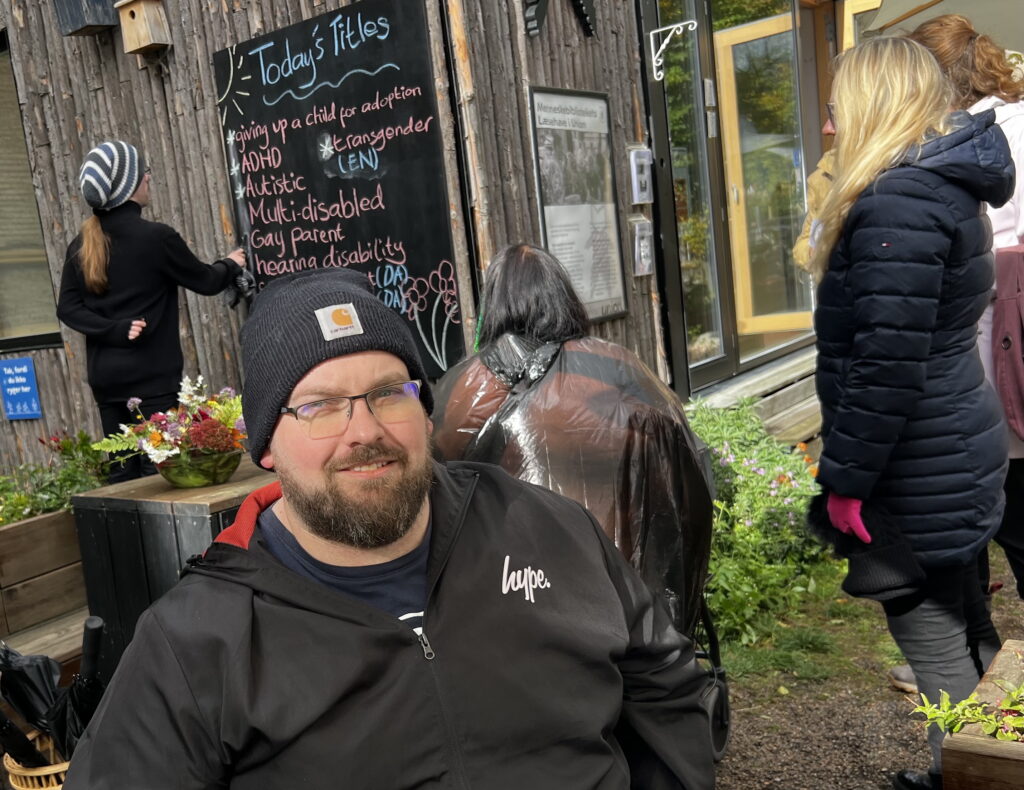
“Outside the library, it’s made me want to understand situations more, so I hope it’s made me a little bit more patient, a little bit more curious and a little bit more understanding,” said Fadden, who works as a disability rights activist, as well as an inclusion and accessibility consultant back home in the UK. “I can’t say I fully, fully ‘unjudged’ everyone — because we’re always challenged on that — but I’m a work in progress.”
When Ronni Abergel founded The Human Library in Copenhagen in 2000, he hoped it would help people from different backgrounds better understand each other.
“Maybe there’s less to be afraid of once we get talking to people,” Abergel said. “So, sometimes it just might seem better to actually meet somebody who is trans or a policeman or a sex worker before you make up your mind about them.”
The son of a Danish mother and Moroccan father, Abergel says the “open book” concept was inspired by the many questions asked about his own identity.
“‘Why do you have brown hair? Why do you have brown eyes? Why are you not blue eyed and blond like the rest of the Scandinavians?” are some of the questions Abergel said he’s been asked throughout his life. “But I’m just as Scandinavian as they are. And I grew up here, and it’s my country. I speak Danish, and I am part of the Danish culture. So, I came up with the idea because I thought there are too many conversations it seems we can’t have.”
Today, partner organizations can be found across the globe, including Australia, Japan, Botswana and the United States. But these conversations have not always been welcome.
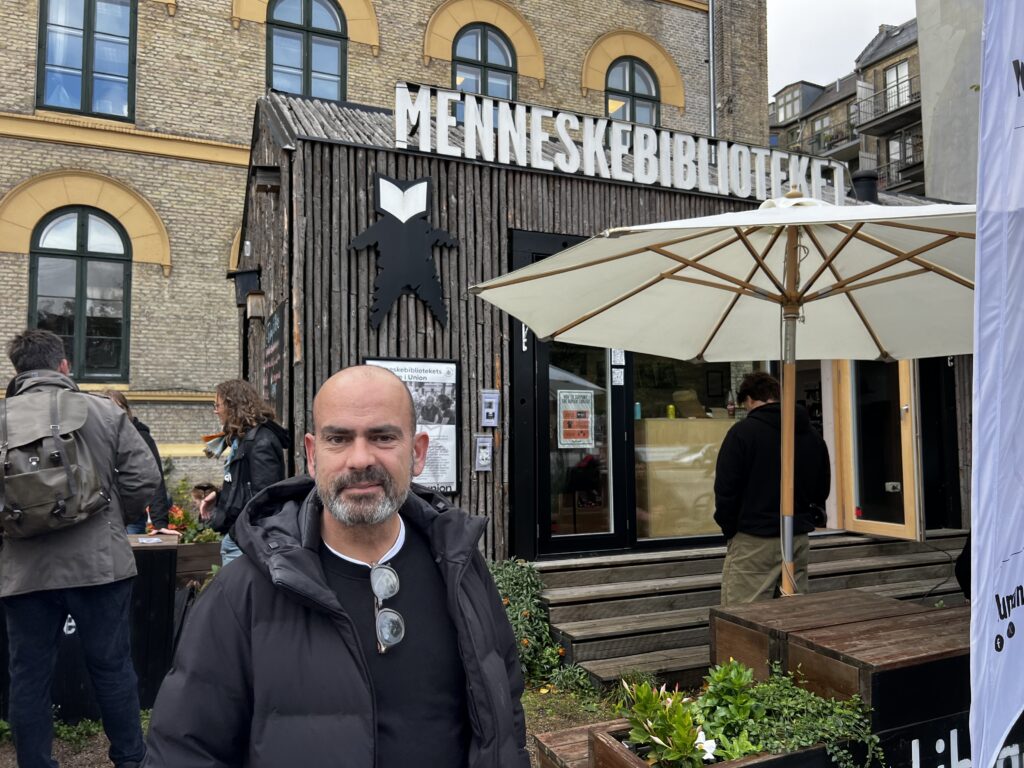
In 2016, the Russian State Library in St. Petersburg wanted certain “open books” pulled from a reading event. “We have some reservations regarding four of your books: the sex worker, the person without a child, the ex-prisoner and the homosexual,” a message from the State Library stated. “We would be very grateful if you could accept our intolerance regarding this issue and make sure these books are not present at the event.”
In that case, Abergel said the local Human Library organizers were able to move the event nearby. But he said the organization is now facing bigger setbacks.
The Copenhagen reading garden, where the books have regularly met with visitors for the past five years, is closing indefinitely. According to Abergel, it’s due to a significant loss in revenue in recent years.
“We live in polarizing times, which means there isn’t the same support for the type of work that we do that there was in the past,” Abergel said.
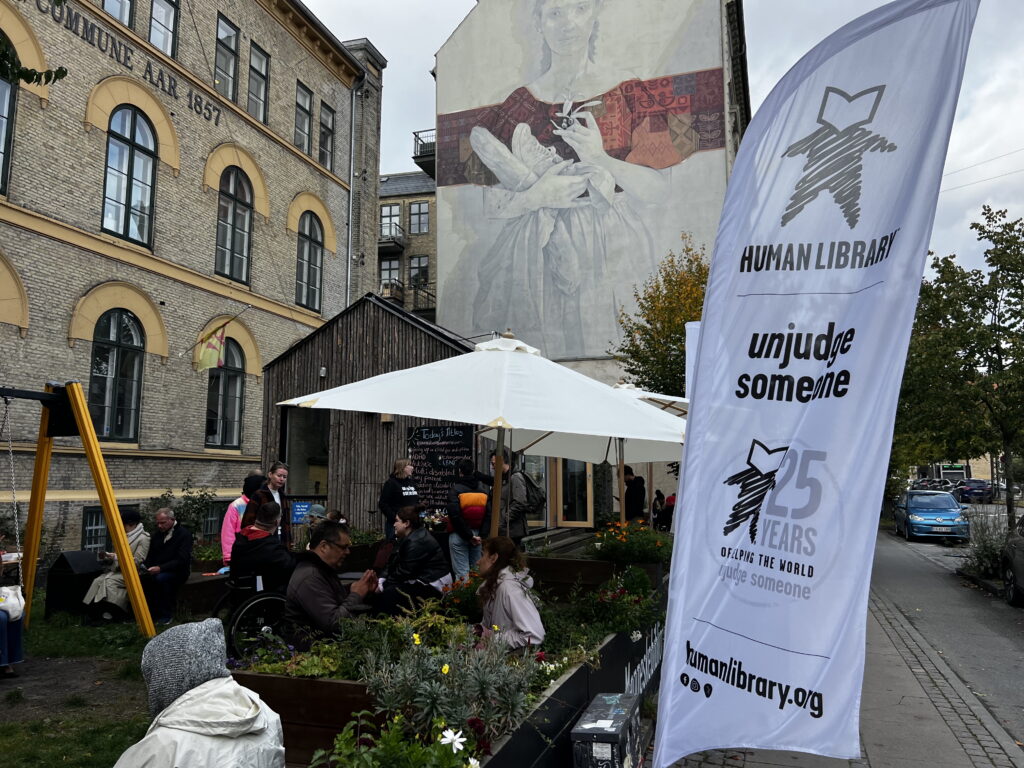
Although The Human Library is a nonprofit, only about 3% of its funding comes from donor support. Abergel said that The Human Library’s mission to help improve understanding between different groups and communities translated well into diversity, equity and inclusion training for corporations, now a key source of funding.
For the longest time, US companies made up the single biggest group of corporate partners for the organization’s DEI. But in the years since US President Donald Trump announced his re-election bid in 2022 and turned his rhetoric against DEI initiatives, Abergel said the majority of his more than 200 partners in the US have cut ties.
“We’ve definitely felt the change of policy and change of administration in the US, where a lot of our partnerships were from,” Abergel said. “People have withdrawn, and we’ve had to reduce our activities and our programming. And, to be honest, we’re hurting.”
Financial documents from The Human Library Organization seen by The World show an overall drop in revenue from $1.8 million in 2023 to less than half that amount in 2025, with the share of US falling from 42% to 29%.
While Abergel doesn’t have the resources to keep the reading garden open right now, he said the library’s conversations will continue at pop-up events at schools, festivals or wherever “open books” are still welcome.
The post People are ‘open books’ at Copenhagen’s Human Library appeared first on The World from PRX.




